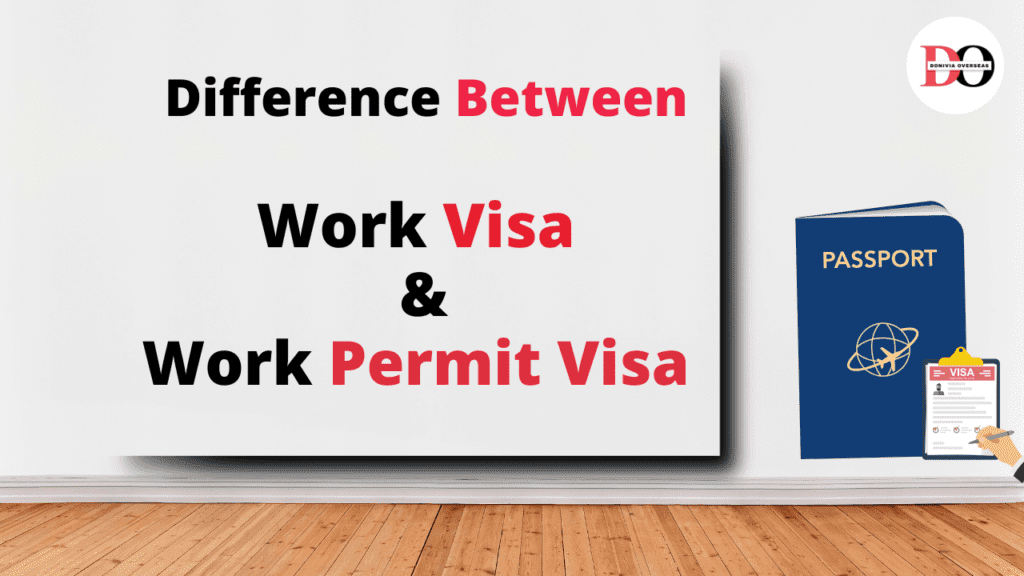
Work Visa
A work visa is an official document issued by a foreign country’s government, granting permission for an individual to enter that country for the purpose of employment. It authorizes the holder to legally work for a specific employer or in a particular occupation for a predetermined period. Work visas are typically required for individuals seeking employment opportunities in a country where they are not citizens or permanent residents. The specific requirements and application process for obtaining a work visa vary depending on the destination country’s immigration policies and the type of work being pursued.
Work Permit Visa
A work permit is indeed a crucial document that facilitates legal employment for foreign nationals in a specific country for a predetermined duration. Typically, it’s a requisite complement to a visa. The criteria for securing a work permit hinge on factors like the host country and the nature of the prospective employment. Certain professions or sectors necessitate demonstrated expertise, previous employment records, and even educational credentials verification.
To secure a work permit, furnishing documentation such as a valid passport, evidence of education or relevant experience, and a formal job offer or contract is usually mandatory. Additionally, applicants might undergo medical evaluations and provide police clearance certificates. Employers might also be required to furnish supplementary paperwork or endorse the work permit petition.
Key Differences between a work visa and a work permit:
-
Authorization Purpose:
- Work Visa: Specifically grants permission to enter a country for employment purposes.
- Work Permit: Grants authorization to work within a country, typically to individuals already legally present.
-
Entry Permission:
- Work Visa: Includes both work authorization and permission to enter the country.
- Work Permit: Requires a pre-existing legal status in the country, such as a tourist visa or residence permit, for entry.
-
Employer Sponsorship:
- Work Visa: Often requires sponsorship from a specific employer and is tied to a particular job offer.
- Work Permit: May offer more flexibility as it’s not necessarily tied to a single employer, allowing for job changes under certain conditions.
-
Duration:
- Work Visa: Validity typically aligned with the duration of the employment contract.
- Work Permit: Validity period may vary, depending on the issuing country’s regulations and the individual’s circumstances.
-
Application Process:
- Work Visa: Applied for at a consulate or embassy abroad before traveling to the destination country.
- Work Permit: Applied for within the host country, often through the appropriate immigration authorities.
-
Eligibility Criteria:
- Work Visa: Often requires proof of a job offer, qualifications, and sometimes language proficiency.
- Work Permit: Eligibility may depend on factors such as the individual’s visa status, labor market conditions, and employer sponsorship.
-
Dependents:
- Work Visa: Typically allows for accompanying dependents to join the visa holder in the host country.
- Work Permit: Rights for dependents may vary depending on the issuing country’s regulations.
-
Portability:
- Work Visa: May restrict the visa holder to working only for the sponsoring employer.
- Work Permit: Often offers more flexibility, allowing the holder to change jobs or employers under certain conditions.
-
Renewal Process:
- Work Visa and Work Permit: Renewal procedures vary based on the host country’s immigration policies and may require meeting specific criteria.
-
Rights and Benefits:
- Work Visa and Work Permit: Rights and benefits, such as access to healthcare, social security, and other services, may vary depending on the host country’s regulations and the type of visa or permit held.
If you are ready to apply work visa and work permit visa. so consult with our Visa Consultant in Delhi. Donivia Overseas has well-experience team and high work visa success rate. Let’s begin the abroad journey now.

